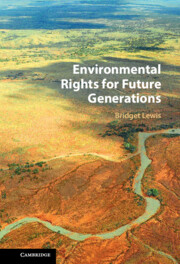Book contents
- Environmental Rights for Future Generations
- Environmental Rights for Future Generations
- Copyright page
- Dedication
- Contents
- Table of Cases
- Table of International Conventions
- Abbreviations
- 1 Introduction
- 2 The Rationale
- 3 The Law
- 4 The Problem
- 5 New Theory and Practice
- 6 Unconventional Natural Resource Extraction
- 7 Climate Adaptation, Decarbonisation and Geoengineering
- 8 Nuclear Energy
- 9 Conclusion
- Bibliography
- Index
5 - New Theory and Practice
Published online by Cambridge University Press: 11 October 2025
- Environmental Rights for Future Generations
- Environmental Rights for Future Generations
- Copyright page
- Dedication
- Contents
- Table of Cases
- Table of International Conventions
- Abbreviations
- 1 Introduction
- 2 The Rationale
- 3 The Law
- 4 The Problem
- 5 New Theory and Practice
- 6 Unconventional Natural Resource Extraction
- 7 Climate Adaptation, Decarbonisation and Geoengineering
- 8 Nuclear Energy
- 9 Conclusion
- Bibliography
- Index
Summary
Building on the problems identified in Chapter 4, Chapter 5 presents a new theory and practice of environmental rights which it argues would better protect the rights of future generations. First, it outlines a theory of intergenerational responsibility for international human rights law, drawing on Edith Brown Weiss’s theory of intergenerational equity. The chapter takes the tripartite duties commonly used in international human rights laws (the duties to respect, protect and fulfil human rights) and gives them new meaning through the application of an intergenerational lens. The result is a typology of duties for states which can be used to articulate expectations and standards with respect to the rights of future generations. The chapter also outlines changes which are needed to the rules of standing and causation to enable the litigation of future generations’ environmental rights. The proposed changes are informed by existing principles of environmental law, including due diligence and the precautionary principle, which help to navigate questions regarding risk and uncertainty and enable a more meaningful application of human rights law to threats of future harm.
Keywords
Information
- Type
- Chapter
- Information
- Environmental Rights for Future Generations , pp. 92 - 125Publisher: Cambridge University PressPrint publication year: 2025
Accessibility standard: WCAG 2.2 AAA
Why this information is here
This section outlines the accessibility features of this content - including support for screen readers, full keyboard navigation and high-contrast display options. This may not be relevant for you.Accessibility Information
Content Navigation
Allows you to navigate directly to chapters, sections, or non‐text items through a linked table of contents, reducing the need for extensive scrolling.
Provides an interactive index, letting you go straight to where a term or subject appears in the text without manual searching.
Reading Order & Textual Equivalents
You will encounter all content (including footnotes, captions, etc.) in a clear, sequential flow, making it easier to follow with assistive tools like screen readers.
You get concise descriptions (for images, charts, or media clips), ensuring you do not miss crucial information when visual or audio elements are not accessible.
Visual Accessibility
You will still understand key ideas or prompts without relying solely on colour, which is especially helpful if you have colour vision deficiencies.
You benefit from high‐contrast text, which improves legibility if you have low vision or if you are reading in less‐than‐ideal lighting conditions.
